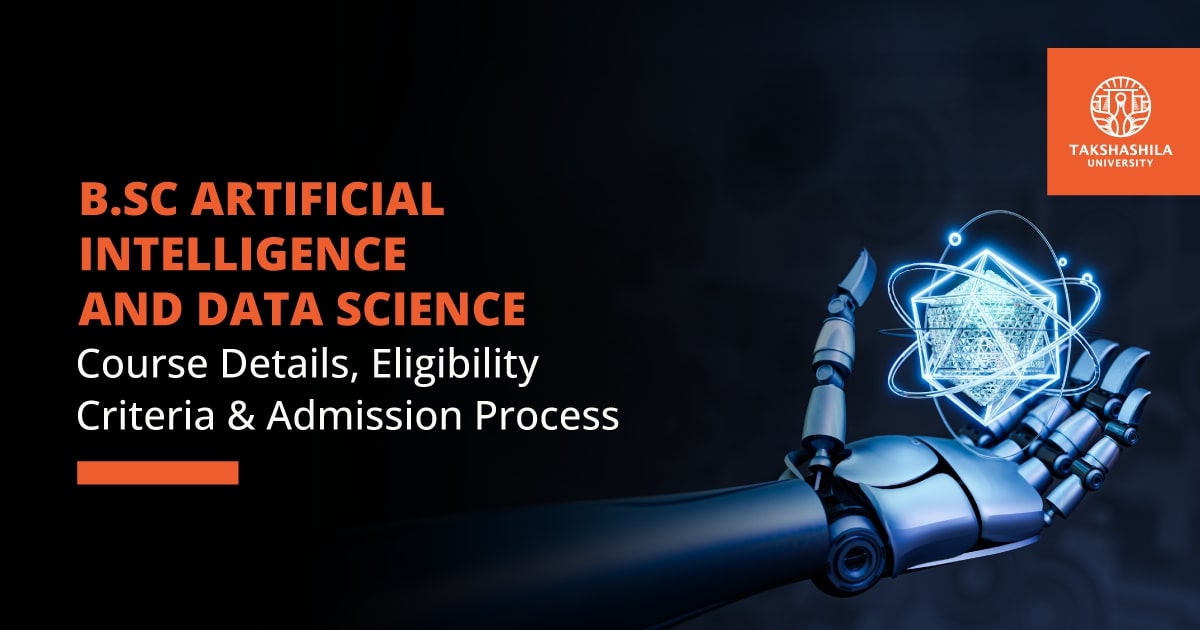Introduction to BSc Artificial Intelligence & Data Science
Artificial Intelligence (AI) and Data Science are today’s most transformative fields. As more businesses and organisations become data-driven, the demand for skilled Data Science and AI professionals is rising quickly. The B. Sc. in Artificial Intelligence and Data Science has been formulated to provide the students with the requisite knowledge and competency to perform effectively in these lucrative areas of specialisation.
At Takshashila University , the B.Sc AI and Data Science program integrates the theoretical foundations of AI, machine learning, big data analytics, and data visualisation with practical applications. This program is ideal for those interested in system automation, predictive modelling, or massive data analytics to identify patterns or trends within the data. It hopes to prepare practitioners for several exciting employment opportunities in technology and business.
Let’s look at all the details, such as B.Sc Artificial Intelligence and Data Science: Course Details, Eligibility Criteria, and Admission Process, which will be explained in this article.

Overview of the B.Sc Artificial Intelligence and Data Science Course
The B.Sc in Artificial Intelligence and Data Science course is three years long and comprises six underlying semesters. The curriculum is also designed to present the basic tenets of mathematics, programming, machine learning concepts, and data analysis. On other levels, learners will be introduced to advanced topics in deep learning, natural language processing (NLP), and big data technologies.
Throughout the program, students will examine practical cases and employ tools relevant to the real world, thus gaining professional exposure. As a result, students learn how to solve complex problems creatively since AI or Data Science poses many intricate challenges.
After graduation, you will have the expertise and technical competence to enter multiple industries such as finance, healthcare, advertising, e-commerce and many other sectors where data and AI are at the core of decision-making.
Critical Concepts in B.Sc Artificial Intelligence and Data Science
The program encompasses both the theoretical and practical parts of AI and Data Science. Some of these concepts addressed in the coursework are highlighted below.
- Artificial Intelligence (AI): The course units taught include AI concepts such as machine learning (ML), deep learning, neural networks, and natural language processing (NLP). AI aims to build systems that can carry out tasks that usually require human intelligence, such as language translation, face recognition, and decision-making.
- Machine Learning (ML): This area in AI involves creating algorithms that enable computers to learn from data over time. Objectives include supervised and unsupervised learning, regression methods, classification techniques, and reinforcement learning.
- Data Analytics: Students will learn to evaluate and interpret large data sets using statistical and machine-learning techniques. This includes issues of data cleaning, preparation, visualisation, and contributing to insights.
- Big Data: The program covers big data technologies like Hadoop, Spark and NoSQL databases. These technologies handle and process large amounts of data that traditional systems cannot support.
- Data Visualization: Graphical, symbolic forms such as graphs, charts, and dashboards. Students will have the necessary skills to visualise complex data and information appropriately in the course. They will appreciate how to work with tools such as Tableau, Power BI, and the Python libraries Matplotlib and Seaborn to display information graphically.
- Deep Learning: Deep learning is another machine learning form that involves the deep neural network in interpreting information from the dataset. This is advantageous in image recognition or computer vision, speech processing, and self-driving cars.
- Natural Language Processing (NLP): Natural language processing looks into how computers, artificial or otherwise, can comprehend, analyse, and even generate human language. Given this, it is easily understood that this area provides most of its services and benefits to AI applications such as chatbots, language translation, transcribers, and voice assistants.
Emerging Fields in AI and Data Science
AI and Data Science are some of the youngest and fastest-developing industries in technology today. The B.Sc AI and Data Science programme provides access to numerous emerging specialities such as:
- Predictive Analytics: Predictive analytics is a method that uses past events to foresee future trends and behaviours. Fields like marketing, finance, and healthcare make use of this approach.
- AI in Healthcare: AI and data science combine to process medical information to diagnose, discover drugs, and provide various kinds of individualised therapy.
- Robotics: AI is one of the most important drivers behind the design of such autonomous robots for manufacturing, healthcare, and logistics.
- Autonomous Systems: AI-powered driving vehicles, AI drones, and all other systems operated by AI are evolving our ideas of transportation and delivery.
- AI Ethics and Bias: As AI spreads into mainstream society, it’s also essential to define ethical boundaries and research socially relevant areas such as algorithmic bias.
Career Opportunities in B.Sc Artificial Intelligence and Data Science
The graduates of the B.Sc in AI and Data Science programme can explore countless career possibilities at both technical and business levels. A list of some job roles that are usually in demand includes the following:
- Data Scientist: Data scientists work with relatively larger data sets than ordinary people. They employ statistics, machine learning, data visualisation, and more methods to extract answers from data and assist in making decisions.
- Machine Learning Engineer: Machine Learning engineers are specialised designers of machine learning algorithms. They feed data into these algorithms and use the trained algorithms for prediction and automation purposes.
- AI Developer: AI developers build intelligent systems that harness machine learning and deep learning to accomplish tasks such as recognising images, translating languages, and predicting outcomes.
- Data Analyst: Data analysts use statistical datasets to conduct analyses, prepare reports, and assist businesses and organisations in decision-making.
- Business Intelligence Analyst: BI analysts assist organisations with data analysis and reporting to promote data-led decisions. They create dashboards and visuals with Tableau and Power BI, among other things.
- Big Data Engineer: Big data engineers implement and operate big data infrastructures using Hadoop, Spark Big Data and other cloud providers.
- AI Researcher: AI researchers research to create new AI models, algorithms, and other artificial intelligence techniques. This is often a research position in an academic or corporate institution.
Why You Should Join Takshashila Engineering College
First, this is one of the leading institutions offering cutting-edge BSc in AI and data science programmes. Here are a few reasons why you should choose Takshashila for your studies:
- Experienced Faculty: Our professors are already in AI, data science, and machine learning. They expand the student’s perspective of the concepts and practical work as they are active in the industry.
- State-of-the-Art Facilities: Takshashila Engineering College has modern, well-stocked labs where students are trained on the most recent AI and data science tools and platforms, including Python, R, Tableau, and Tensor Flow.
- Industry Collaborations: We are in close contact with reputable tech companies to provide internship placements, workshops, and exposure for our students to ensure they are market-ready and practice-oriented.
- Comprehensive Development Programs: Students are also encouraged in other areas besides academics, such as voluntarism, where several workshops related to communication skills and personality development have been conducted to sharpen them.
- Placement Support: Last but not least, the college has a good reputation for placements. There is a career cell that assists students with job applications, mock interviews, and connecting with the best employers.
Eligibility Criteria for B.Sc Artificial Intelligence and Data Science
At Takshashila Engineering College, the B.Sc AI and Data Science program is open to applicants who satisfy the following criteria:
- Academic Requirements: The candidates should have completed 12th education (or equivalent) from a math and computer science background in the science stream.
- Age Requirements: Candidates should have attained the age of seventeen (17) years on or before the date of admission to the programme.
- Skills: The applicants should be problem solvers and possess logical thinking, technology, and data-driven skills.
Admission Process for B.Sc Artificial Intelligence and Data Science
Takshashila Engineering College’s admission procedure is as uncomplicated and straightforward as possible. Follow this process step-by-step.
- Application Submission: The candidate has to fill out an online application form on the official website of Takshashila Engineering College once they are interested in making an application.
- Entrance Examinations: Applicants must take an entrance test that evaluates their mathematical, logical, and computer science skills.
- Personal Interview: Candidates selected during the first stage will proceed to an interview to determine the candidates’ motivation in AI and Data Science and whether they can tackle issues.
- Final Admission: Eligible applicants for the program will be selected based on the evaluation of various criteria, including performance in both the test and the interview.
Curriculum and Course Structure
The curriculum for the B.Sc A. The I and Data Science program at Takshashila Engineering College has been structured so that students are provided with in-depth knowledge of the basic and advanced components of A. I and Data Science. Here are the details of the curriculum:
- Year 1: Elements of Programming, Mathematics for Artificial Intelligence, Data Structures, Linear Algebra, and instances of Probability and Statistics.
- Year 2: ML Algorithms, Data Handling, Data Analytics, Visualization, working the tools of Big Data, Introduction to Deep Learning and basic concepts.
- Year 3: Capstone Project focusing on Scheduling Algorithm Implementations, Design for Deep Learning, Natural Language Processing Toolkits, and Data Retrieval for Big Data Systems.
Laboratory and Practical Training
Practical learning is one of the most, if not the most, essential elements of the B.Sc AI and Data Science program. They are working on real-world projects, employing practical tools used in the industry and having experience working in areas such as machine learning, data analysis, and AI development, to name a few.
Scope and Future for B.Sc AI and Data Science Graduates
After completing the B.Sc in AI and Data Science program, graduates can pursue a wide range of job options. The prospects appear promising, as demand for AI and data science professionals will always be high in tech, healthcare, finance, marketing, and others.
Postgraduate and Research Opportunities
Students are eligible for postgraduate programs only after completing the B.Sc in AI, Data Science, or any relevant major. Some known examples would be an M.Sc in Data Science, another M.Sc in artificial intelligence, and an M.Tech in machine learning. Research possibilities are also there for those who want to build a new AI algorithm or data-enabled technology.
Conclusion
The Artificial Intelligence and Data Science program offered by B Sc in Takshashila Engineering College aligns with what passionate students of AI and data-oriented jobs can pursue and is a valuable program. The program is career-oriented in one of the most sought-after fields today, with a considerable promise for employment opportunities due to the right mix of healthy academics, practical exposure, and industry connections.
If you have any further queries regarding the fee structure, contact Takshashila mentors today
FAQ
1.Please specify how long it will take to complete the B.S.c AI and Data Science course.
The course is three years and comprises six semesters split into units.
2.What’s the eligibility to apply?
Applicants should have finished their 12th standard education. The emphasis should be science with math inclusion.
3.What kind of future work can a student expect after course completion?
Some jobs graduates may undertake involve being data scientists, machine learning engineers, AI developers, prominent data engineers, business intelligence analysts, etc.
4.Are students offered practicals as part of study-based activities throughout the study duration?
Yes, ample practical experience in ML, data analysis, and AI would be covered during the project’s training, workshops, and other modern-day activities/tests.
5.Do students need to sit for the entrance examination to be considered for the program?
Yes, a seat examination might be administered to determine one’s knowledge of mathematics, logical thinking, and computer science.
6.Is it possible to undertake academic study at the postgraduate level after earning this particular degree?
Some graduates opt for post-graduation, such as M.Sc in Data Science or M.Tech specialising in Artificial Intelligence after finishing their B.Sc degree.






